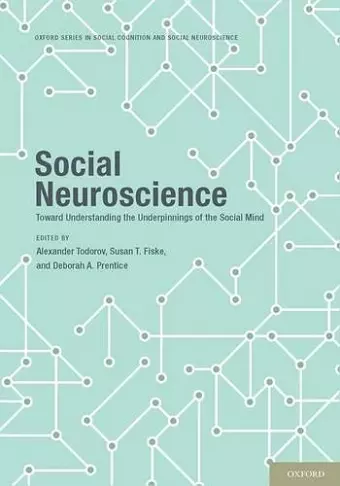Social Neuroscience
Toward Understanding the Underpinnings of the Social Mind
Alexander Todorov editor Susan Fiske editor Deborah Prentice editor
Format:Hardback
Publisher:Oxford University Press Inc
Published:17th Feb '11
Currently unavailable, and unfortunately no date known when it will be back
This hardback is available in another edition too:
- Paperback£56.00(9780199361052)

The field of social cognitive neuroscience has captured the attention of many researchers during the past ten years. Much of the impetus for this new field came from the development of functional neuroimaging methods that made it possible to unobtrusively measure brain activation over time. Using these methods over the last 30 years has allowed psychologists to move from simple validation questions -- would flashing stimuli activate the visual cortex -- to those about the functional specialization of brain regions-- are there regions in the inferior temporal cortex dedicated to face processing-- to questions that, just a decade ago, would have been considered to be intractable at such a level of analysis. These so-called "intractable" questions are the focus of the chapters in this book, which introduces social cognitive neuroscience research addressing questions of fundamental importance to social psychology: How do we understand and represent other people? How do we represent social groups? How do we regulate our emotions and socially undesirable responses? This book also presents innovative combinations of multiple methodologies, including behavioral experiments, computer modeling, functional Magnetic Resonance Imaging (fMRI) experiments, Event-Related Potential (ERP) experiments, and brain lesion studies. It is divided into four sections. The first three sections present the latest research on, respectively, understanding and representing other people, representing social groups, and the interplay of cognition and emotion in social regulation. In the fourth section, contributors step back and consider a range of novel topics that have emerged in the context of social neuroscience research: understanding social exclusion as pain, deconstructing our moral intuitions, understanding cooperative exchanges with other agents, and the effect of aging on brain function and its implications for well-being. Taken together, these chapters provide a rich introduction to an exciting, rapidly developing and expanding field that promises a richer and deeper understanding of the social mind.
Todorov, Fiske and Prentice have assembled the leading figures of the nascent field of social neuroscience in a volume that is rich with ideas and the data to support them. Using data from brain lesions, EEG, and fMRI, the authors consider how brain systems are organized to support social behavior. The text considers brain systems involved in issues such as racism and dehumanized perception, the distinction between thinking about the self and about others, self-regulation and the symbolic processing of affect, emotional decision making, the components of trustworthiness in face perception, and the fate of the soul. This book is very accessible and will appeal to a broad audience that includes scientists within related fields of psychology and neuroscience, but also non-experts who are interested in how social behavior is organized in the brain. --Gregory McCarthy, Professor of Psychology, Yale University "Social Neuroscience has revolutionized how people think about social behavior. In a collection of compelling rigorous essays, the leading experts lay out the foundations of this exciting new field. This is the cutting edge of science." --Shelley E. Taylor, Distinguished Professor, Department of Psychology, University of California, Los Angeles "Social Neuroscience provides an up-to-date survey of key themes and findings, focusing on cognitive neuroscience studies in humans. Contributions from many of the major players in the field cover topics ranging from face perception, to stereotyping and bias, to regulation, decision-making and moral judgment. Especially valuable are brief synthetic commentaries at the end of each section. The volume will be an accessible introduction for upper-level undergraduates and graduate students, and a valuable reference source for all investigating human social cognition. Importantly, the contributions all convey the excitement of the field and point to future studies, fuel for motivating the next generation of young scientists in social neuroscience." --Ralph Adolphs, Professor of Psychology and Neuroscience, California Institute of Technology "Social Neuroscience: Toward Understanding the Underpinnings of the Social Mind is an informative and valuable resource for a diverse audience and various professional fields- including social psychology, neuroscience, anthropology, medicine, political science, economics, and philosophy- as well as for laymen with an ardent interest in biophilosophical inquiry." -- Sigmund Hough, PhD, ABPP, Assistant Professor, Psychiatry at Harvard Medical School; Maggi Budd, PhD, MPH, ABPP, Instructor in the Department of Psychiatry, Harvard Medical School; PsychCRITIQUES
ISBN: 9780195316872
Dimensions: 180mm x 257mm x 23mm
Weight: 930g
328 pages